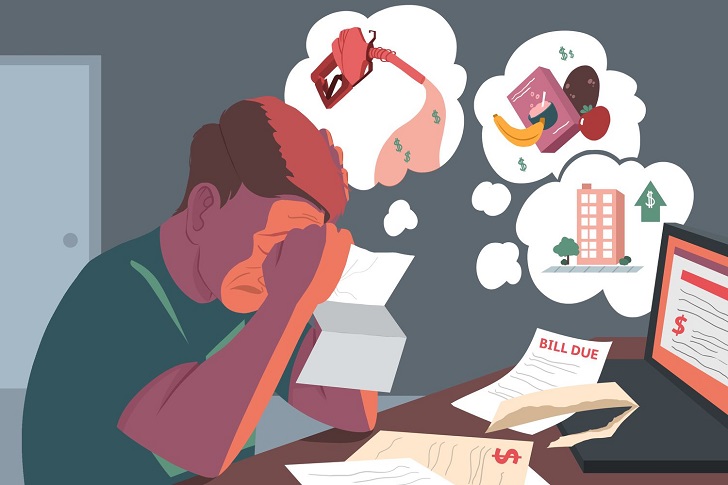
Does Inflation Benefit Lenders or Borrowers?

Inflation is a measure of the rate at which the general level of prices for goods and services is rising, and it is a key factor in the economy. It affects everything from interest rates to investment strategies and significantly impacts lenders and borrowers.
One question that often arises is whether inflation favors lenders or borrowers.
Inflation and Lenders
Lenders are institutions or individuals that provide funds to borrowers, such as banks and other financial institutions. Inflation can be beneficial for lenders because it can increase the value of the money they lend out.
When inflation occurs, the purchasing power of money decreases over time, which means that lenders can get back more in real terms than they originally lent out.

VINCENT MARTIN/ GETTY IMAGES | As of May 2022, the U.S. annual inflation rate is 8.6%
For example, if a lender lends $100 to a borrower at an interest rate of 5% per year and inflation is 2% per year, the lender would earn a real interest rate of 3%. This means that the lender would earn $105 at the end of the year, but the purchasing power of that money would only be $103.
With inflation, the value of the money the lender receives at the end of the year is higher than the value of the money they lent out, making inflation beneficial for lenders.
Inflation and Borrowers
Borrowers are individuals or institutions that receive funds from lenders. Inflation can be detrimental to borrowers because it decreases the purchasing power of the money they borrow.
When inflation occurs, the cost of goods and services increases, meaning borrowers will have to pay more for the same amount of goods and services in the future.

GETTY IMAGES/ ISTOCKPHOTO | Continued inflation inevitably leads to catastrophe
For example, if a borrower takes out a loan of $100 at an interest rate of 5% per year and inflation is 2% per year, the borrower would have to pay back $105 at the end of the year.
However, because of inflation, the purchasing power of that money would only be $103. This means that the borrower would have to pay back more in real terms than the sum they originally borrowed, making inflation detrimental to borrowers.
Implications for Lenders and Borrowers
The impact of inflation on lenders and borrowers depends on a variety of factors, including the inflation rate, the interest rate, and the length of the loan.
Generally, lenders tend to benefit more from inflation when interest rates are high and inflation is low. In contrast, borrowers tend to benefit more when interest rates are low and inflation is high.

Verywell/ Laura Porter | Central banks are raising interest rates to dampen demand and contain inflation
For lenders, inflation can be beneficial in the short term, as they can earn a higher real interest rate. However, if inflation continues to rise over time, it can erode the value of their assets, making them worse off in the long term.
For borrowers, inflation can be detrimental in the short term, as they have to pay back more in real terms than they borrowed. However, if inflation continues to rise over time, the value of their debt can decrease, making it easier for them to pay it back in the long term.
More in Business
-
`
Why New York Nightlife Keeps Attracting Visitors Worldwide
New York comes alive after dark in a way few places on earth can match. The city never limits itself to...
September 16, 2025 -
`
How Celebrities Are Taking Over the Business World
The definition of celebrity success has expanded well past awards and sold-out tours. Today, many Hollywood names are equally focused on...
September 9, 2025 -
`
Which Foods Should You Avoid When on Holiday?
Vacations are meant to be filled with unforgettable moments, but one wrong meal can turn a dream trip into a health...
September 2, 2025 -
`
Quantum Computing Set to Give Commercial Real Estate a Major Lift
Quantum computing is no longer a concept confined to research labs. It is steadily moving toward commercial use, and with that...
August 26, 2025 -
`
Is Your Office Suffering from ‘Culture Rot’? Here’s How to Spot It
A healthy workplace doesn’t need to be perfect, but it should inspire productivity, respect, and trust. Yet, an alarming trend is...
August 19, 2025 -
`
The Small Businesses That Built Musk’s Empire Are Now Bankrupt
What looked like a dream deal for small businesses working with Elon Musk’s companies turned into a financial nightmare for many....
August 12, 2025 -
`
The $2.3 Billion Food Waste Challenge in Short-Term Vacation Rentals
Short-term vacation rentals may offer comfort, but they also come with a hidden cost—food waste. A recent study from Ohio State...
August 5, 2025 -
`
As Markets Decline, Climate Tech Advocates Push for Alternative Funding
Funding in climate technology didn’t vanish—it simply stopped pretending to be easy. After years of aggressive capital inflows, the sector is...
July 29, 2025 -
`
Cowboy Superstitions and Traditions That Might Surprise You
Picture this: the chute clangs open, dust plumes, and all eyes track a cowboy mid-stride. But what the crowd doesn’t see...
July 22, 2025















You must be logged in to post a comment Login